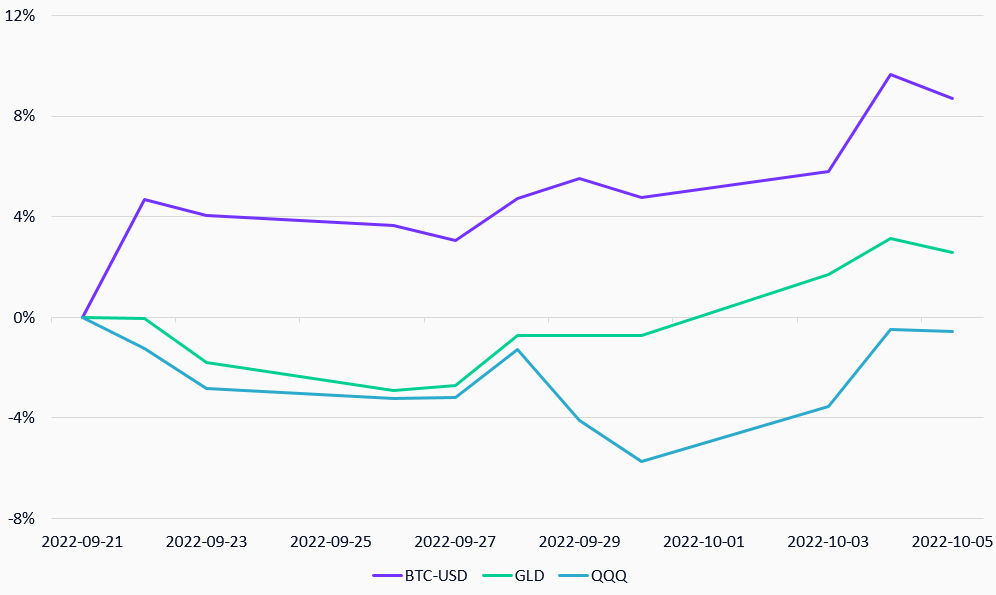Before there is a loud outcry, this quote did not come from me. At the G-10 Rome meetings held in late 1971 secretary of the Treasury John Connally proclaimed to his astonished counterparts, “The dollar is our currency, but it's your problem,” having the intended consequence of driving yet another nail into the coffin of Bretton Woods and leading in short order to a roughly 20% depreciation of the dollar.
I think this quote fits very well in our time today. A strong dollar is generally bad for risk assets, but a dollar that is too strong indicates real financial stress. It is fair to say that the British pound, the EURO and the YEN are trading like an emerging market currency these days, or as they say in crypto twitter: “Trading like a sh..tcoin”. Liability Driven Investment (LDI) almost took U.K. pension funds down and European banks are starting to show cracks in the armor.
Interestingly, crypto assets, first and foremost bitcoin, have seen some decoupling in recent weeks. But there's no hiding the fact that bitcoin in particular has been on a roll lately, looking for a new narrative. If we look at the trading volumes in GBP and EUR, it is noticeable that especially in the last few days extremely much has been traded in Bitcoin. As individuals from the UK and EU see the value of their currency collapsing, they effectively selling the pound and euro for Bitcoin. If this were just a trade to capture the volatility, we would have seen similar spikes in May 2021 and certainly in March 2020. But we didn’t.
Even Hedge Fund legend and Billionaire investor Stanley Druckenmiller who has never had a done year said that crypto could make a comeback as citizens begin to distrust their central banks. He sees this outcome as increasingly possible given the state of the global economy, and the Fed’s uphill battle against both inflation and recession. And it isn’t better on the other side of the Atlantic. When we look at the latest actions of the ECB and BOE, one is overcome by a feeling of helplessness.
Is this just another crypto narrative shift? I think what is exciting about Bitcoin in specifically, is not that it is an inflation hedge or an uncorrelated asset but a non-state control hedge against unstable monetary regimes, wherever those regimes might be. A currency-like asset class that is not controlled by the government is bound to be an important hedge for a growing number of people.
As you can see in Exhibit 1, the same is true of gold, which sees also encouraging signs of life, especially if we compare the recent days with equities such as the Nasdaq.
Cumulative Returns since last FOMC meeting

Source: MarketVector IndexesTM, Yahoo Finance, data as of October 5, 2022
The MVIS® CryptoCompare Bitcoin Index (ticker: MVBTC) measures the performance of a digital assets portfolio which invests in Bitcoin. While it's too early to tell if this is simply seller exhaustion or a new bullish narrative, it does not seem entirely coincidental that digital assets such as Bitcoin have found their footing.
Get the latest news & insights from MarketVector
Get the newsletterRelated:
About the Author:
Martin Leinweber is an expert in fundamental and quantitative trading strategies. He sees cryptoassets as a fundamental building block for investors to achieve their return targets in a low interest rate environment. He works as a Digital Asset Product Strategist at MarketVector IndexesTM providing thought leadership in an emerging asset class. His role encompasses product development, research and the communication with the client base of MarketVector IndexesTM. Prior to joining MarketVector IndexesTM, he worked as a portfolio manager for equities, fixed income and alternative investments for almost two decades. He was responsible for the management of active funds for institutional investors such as insurance companies, pension funds and sovereign wealth funds at the leading German quantitative asset manager Quoniam. Previously, he held various positions at one of Germany's largest asset managers, MEAG, the asset manager of Munich Re and ERGO. Among other things, he contributed his expertise and international experience to the establishment of a joint venture with the largest Chinese insurance company PICC in Shanghai and Bejing. Martin Leinweber is co-author of „Asset-Allokation mit Kryptoassets. Das Handbuch“ (Wiley Finance, 2021). It’s the first handbook about integrating digital assets into traditional portfolios. He has a Master in Economics from the University of Hohenheim and is a CFA Charterholder.
For informational and advertising purposes only. The views and opinions expressed are those of the authors but not necessarily those of MarketVector Indexes GmbH. Opinions are current as of the publication date and are subject to change with market conditions. Certain statements contained herein may constitute projections, forecasts and other forward looking statements, which do not reflect actual results. It is not possible to invest directly in an index. Exposure to an asset class represented by an index is available through investable instruments based on that index. MarketVector Indexes GmbH does not sponsor, endorse, sell, promote or manage any investment fund or other investment vehicle that is offered by third parties and that seeks to provide an investment return based on the performance of any index. Inclusion of a security within an index is not a recommendation by MarketVector Indexes GmbH to buy, sell, or hold such security, nor is it considered to be investment advice.




